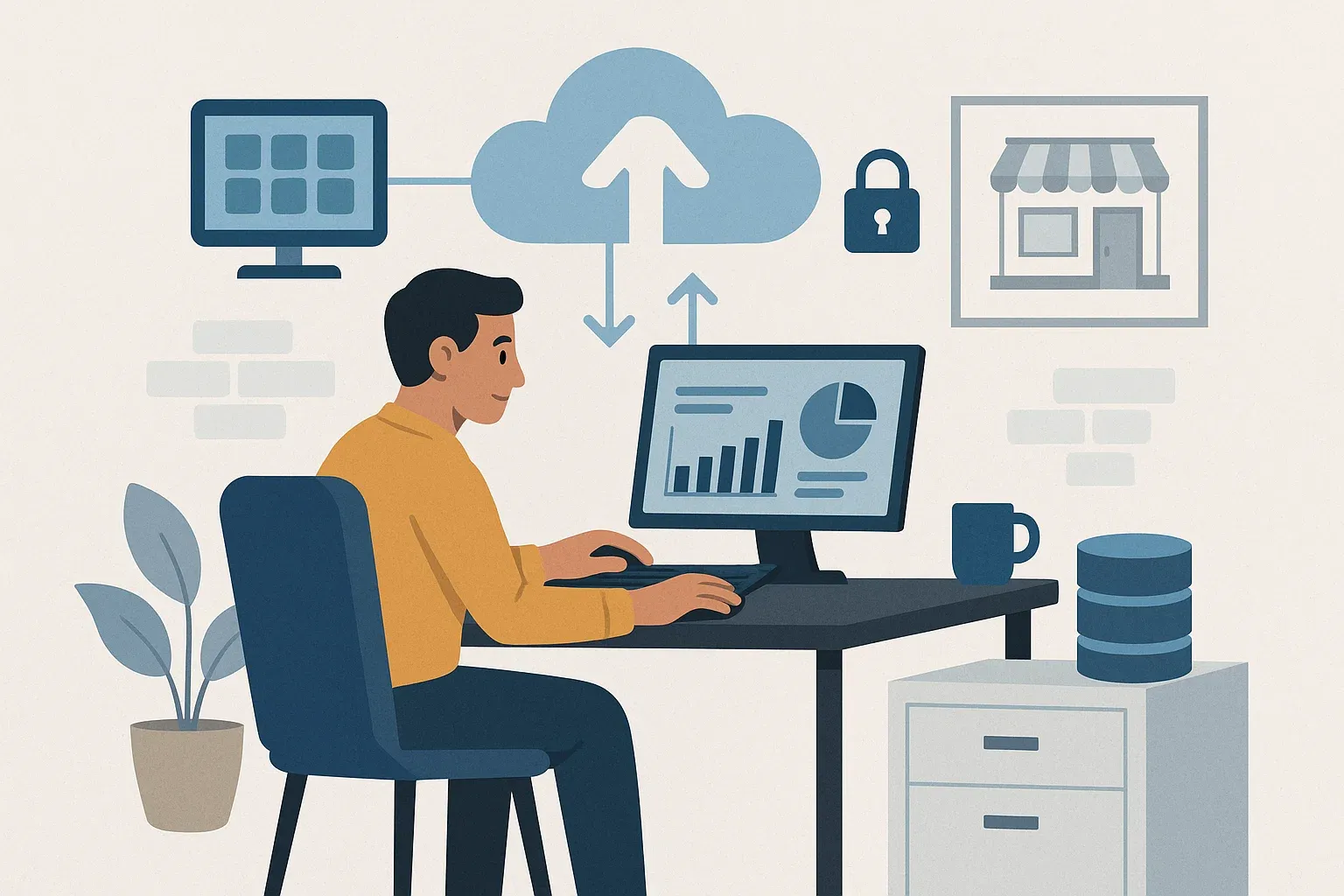
Cloud computing is a technology that lets you store and access data and programs over the internet, instead of on your computer’s hard drive. In simple terms, think of it like keeping your photos, videos, and music on a cloud (a remote server), instead of on your phone or computer. This means you can access your files anywhere, anytime, without worrying about storage space.
In 2025, cloud computing is playing a huge role in shaping technology. It’s not just about storing files anymore—it’s changing how we work, study, and communicate. From businesses to schools, everyone is using cloud technology to do things faster and smarter. In this article, we'll talk about how cloud computing is transforming different areas of life and why it’s so important today.
What Makes Cloud Computing So Special?
Cloud computing makes life easier by offering a lot of benefits:
-
Access Anywhere, Anytime: You can access your data from any device with internet access. Whether you’re at home, school, or the park, you can work on your projects without needing to be in one specific location.
-
No Need for Big Storage: In the past, you needed a lot of storage space on your device to keep files. With cloud computing, you can store everything online, so you don’t run out of space.
Advertisement -
Sharing Made Easy: Cloud computing allows you to easily share files with others. Whether it’s a school project or a business document, you can share them with a few clicks.
-
Security: Many cloud services have great security features to protect your data, so you don’t have to worry about losing important files.
How Cloud Computing is Shaping Businesses in 2025
In 2025, businesses are using cloud computing to work more efficiently and keep costs low. Let’s look at some ways businesses benefit from it:
1. Collaboration Made Simple
With cloud computing, teams can work together easily, even if they are in different parts of the world. Tools like Google Docs, Microsoft 365, and Slack allow teams to share documents, chat, and work on projects together in real-time. This makes businesses run smoother and helps employees get work done faster.
2. Cost Savings
Before cloud computing, companies had to spend a lot of money on hardware and servers to store data. Now, they can store everything online, reducing costs. It’s like renting a storage unit instead of buying one, but the cloud is safer and easier to manage.
3. Flexibility and Scalability
Cloud computing allows businesses to adjust their resources depending on their needs. If a company needs more storage or computing power for a big project, they can easily add more resources without having to buy extra hardware. This flexibility makes businesses more agile.
How Cloud Computing is Impacting Education in 2025
Cloud computing is also changing how students and teachers interact with learning materials. Here's how:
1. Access to Learning Resources
Students can access study materials, homework, and assignments from anywhere. Whether it’s on their laptop, tablet, or even phone, the cloud makes learning easier and more flexible. For example, platforms like Google Classroom and Microsoft Teams allow teachers to upload materials and assignments that students can access at any time.
2. Collaboration Between Students
Just like in business, students can collaborate easily through the cloud. They can work on projects, share ideas, and get feedback without being in the same room. Cloud tools allow them to work together no matter where they are.
3. Storing and Sharing Assignments
Teachers can upload assignments to the cloud, and students can submit their work online. This saves time, reduces paper waste, and makes it easier to keep track of assignments.
How Cloud Computing is Changing Everyday Life
Cloud computing isn’t just for businesses and schools. It’s also making our everyday lives more convenient:
1. Music and Movies on Demand
Think about how you watch movies on Netflix or listen to music on Spotify. These services use cloud computing to stream content directly to your device. You don’t have to worry about storing all the files on your phone or computer because everything is available to you online.
2. Smart Devices
Many of the smart devices in our homes, like smart speakers or thermostats, rely on the cloud to work. These devices connect to the internet and store information on the cloud, which helps them learn from your preferences and improve over time.
3. Backup for Your Files
If you ever lose your phone or computer, cloud services like Google Drive and iCloud allow you to back up your important files. So, even if your device breaks, you won’t lose your photos, contacts, or documents.
Popular Cloud Computing Services in 2025
Here are some of the most popular cloud services people use today:
| Cloud Service | Main Use | Best For | Price |
|---|---|---|---|
| Google Drive | Storing files and sharing documents | Students, professionals | Free (with limited space) |
| iCloud | Storing photos, music, and backups | Apple users | Free (with limited space) |
| Dropbox | File storage and sharing | Businesses, teams | Free (with limited space) |
| Amazon Web Services (AWS) | Cloud computing for businesses | Companies needing extra resources | Paid (depends on use) |
| Microsoft OneDrive | File storage and collaboration | Students, businesses | Free (with limited space) |
How Cloud Computing is Revolutionizing the Future of Technology
Cloud computing is not just shaping today’s technology, but it’s also creating opportunities for the future. Here are some ways it will impact the world:
1. Faster Internet and More Power
In 2025, internet speeds will continue to improve, allowing for faster access to cloud services. With 5G networks becoming more common, cloud computing will be faster and more reliable than ever.
2. Smarter AI
Artificial Intelligence (AI) is growing rapidly, and cloud computing plays a huge role. Cloud services will be able to handle more complex AI tasks, allowing for smarter applications that can help with everything from self-driving cars to personal assistants like Siri and Alexa.
3. More Data, Better Decisions
As more data is collected from different devices, cloud computing will help businesses and individuals make better decisions. For example, health data can be stored in the cloud and analyzed to help doctors make better diagnoses or predict potential health issues.
Frequently Asked Questions (FAQs)
1. What is cloud computing?
Cloud computing is a way to store and access data and applications over the internet instead of on a physical device. It lets you use online services like Google Drive, iCloud, or Dropbox to store files and work on projects from anywhere.
2. How does cloud computing help businesses?
Cloud computing helps businesses save money on hardware, allows employees to collaborate easily, and provides a flexible way to store and access data. It helps companies work faster and more efficiently.
3. Can I use cloud computing for school?
Yes! Students use cloud computing all the time to access learning materials, share projects, and store assignments. Tools like Google Classroom and OneDrive make it easier to study and collaborate with classmates.
4. Is cloud computing safe?
Yes, most cloud computing services use strong security measures to keep your data safe. While there’s always a risk online, the cloud is often more secure than storing files on your personal device.
5. How do I start using cloud computing?
To start using cloud computing, pick a cloud service that fits your needs. Many services like Google Drive and Dropbox offer free versions to get started. Just sign up, upload your files, and you’re ready to go!
Conclusion: The Future of Cloud Computing
Cloud computing is changing how we live, work, and learn. It’s making our lives easier by allowing us to store and access information from anywhere. Whether it's helping businesses work faster, giving students access to resources, or making everyday activities more convenient, cloud computing is playing a huge role in the world today—and it’s only going to get bigger in 2025.
So, why not start using cloud computing today? It’s easy, convenient, and will help you stay connected wherever you go!









